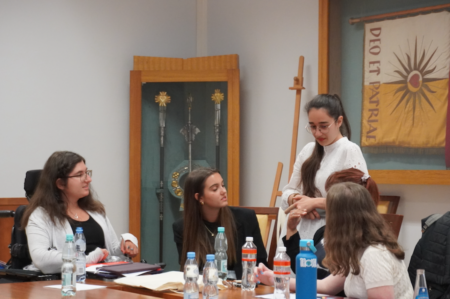
Studying abroad is an incredible opportunity for students to expand their horizons, immerse themselves in new cultures, and gain a deeper understanding of the world. For a group of Loyola Marymount University students, their time in Poland became an unforgettable exploration of interfaith connections, Jewish traditions, and complicated history. With incredible guides, Professor Margarete Feinstein, an expert in Jewish History; Rabbi Mark Diamond, an expert in Jewish thought, and interfaith relations; Professor Holli Levitsky, an expert in Jewish American and Holocaust literature; John Sebastian, vice president for Mission and Ministry at LMU; and Michael Engh, S.J., chancellor of LMU, all the pieces were in place to promote and support a formative experience for the students on this trip.
As the students arrived in Poland, they were immediately captivated by the rich, interwoven interfaith connections present in the country. Poland, known for its diverse religious landscape, has been a meeting point for various faiths for centuries. In the vibrant city streets of Lublin, Krakow, and Warsaw, amidst stunning churches, synagogues, and mosques, students witnessed the coexistence of different religious communities side by side.
The trip was part of the “Vanishing Landscape” course, which covers Jewish history and traditions, and provides students with the unique opportunity to dive into Poland’s Jewish heritage. They visited the historic Kazimierz district in Krakow, once a thriving center of Jewish life and now a vibrant neighborhood brimming with synagogues, museums, and kosher restaurants. Immersed in the atmosphere, they learned about Jewish customs, sampled traditional dishes like challah and pierogi, and engaged in thought-provoking discussions with local Jewish community members, students from The John Paul II Catholic University of Lublin (KUL), and the active Jewish Community Center (JCC) in Krakow.

Poland is significant in Jewish history, making it an ideal destination for students to understand the past better. They embarked on emotional visits to Auschwitz-Birkenau, and Majdanek, infamous concentration and extermination camps that bore witness to the atrocities committed during the Holocaust. Standing amidst the solemn grounds, they reflected on the unimaginable suffering endured by countless individuals and recognized the importance of preserving the memory and legacy of those who perished. The students also visited Warsaw’s POLIN Museum of the History of Polish Jews, showcasing the vibrant life of the Jewish community that once thrived in the country, as well as the challenges and tumultuous times. Interactive exhibits and enduring personal narratives brought to life for students the Jewish experience in Poland throughout the centuries.
The trip was personally, spiritually, and academically transformative for the students. Their exploration of Poland’s Jewish history underscored the importance of remembrance, education, and promoting tolerance. The students returned to LMU with renewed purpose, eager to share their experiences and advocate for interfaith understanding and social justice.
One of those students is Lyza Weisman ‘24, a triple major in Economics (BS), English, Psychology , and a double minor in Theology and Jewish Studies, who was encouraged by Professor Levitsky to take the course and go on the trip despite being mobility impaired. “Anyone that wants to go, no matter the obstacle, we’ll figure it out,” said Professor Levitsky, who brought Soraya Peralez, Weisman’s caretaker, and an additional aid because of the generous support of LMU Jewish Studies donors. The physical strain was sometimes unbearable, but for Weisman, it was still an “incredible experience that gave me more courage to get out of my comfort zone.” Weisman was resilient in enduring the sometimes rough terrain of Poland and conquered every assignment and presentation.
“My perspective has changed profoundly,” said Weisman. “I have many ideas I want to act on at LMU regarding collaboration, interfaith dialogue, and creating understanding, compassion, and respect in an interconnected world.”
By Damian Aguilar, M.A. ’24



